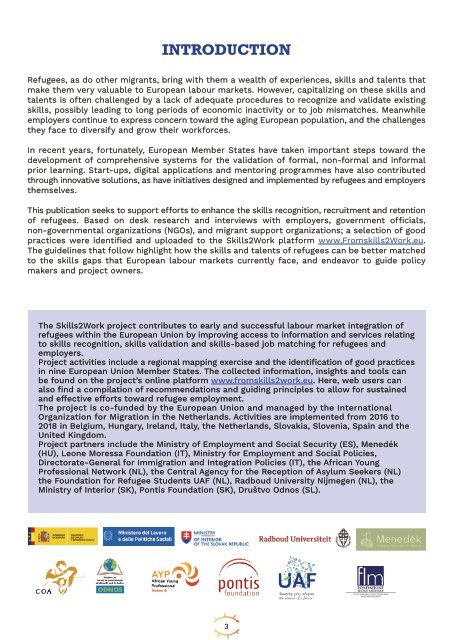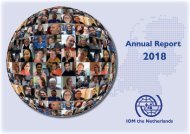Guidelines S2W 2018
You also want an ePaper? Increase the reach of your titles
YUMPU automatically turns print PDFs into web optimized ePapers that Google loves.
INTRODUCTION<br />
Refugees, as do other migrants, bring with them a wealth of experiences, skills and talents that<br />
make them very valuable to European labour markets. However, capitalizing on these skills and<br />
talents is often challenged by a lack of adequate procedures to recognize and validate existing<br />
skills, possibly leading to long periods of economic inactivity or to job mismatches. Meanwhile<br />
employers continue to express concern toward the aging European population, and the challenges<br />
they face to diversify and grow their workforces.<br />
In recent years, fortunately, European Member States have taken important steps toward the<br />
development of comprehensive systems for the validation of formal, non-formal and informal<br />
prior learning. Start-ups, digital applications and mentoring programmes have also contributed<br />
through innovative solutions, as have initiatives designed and implemented by refugees and employers<br />
themselves.<br />
This publication seeks to support efforts to enhance the skills recognition, recruitment and retention<br />
of refugees. Based on desk research and interviews with employers, government officials,<br />
non-governmental organizations (NGOs), and migrant support organizations; a selection of good<br />
practices were identified and uploaded to the Skills2Work platform www.Fromskills2Work.eu.<br />
The guidelines that follow highlight how the skills and talents of refugees can be better matched<br />
to the skills gaps that European labour markets currently face, and endeavor to guide policy<br />
makers and project owners.<br />
The Skills2Work project contributes to early and successful labour market integration of<br />
refugees within the European Union by improving access to information and services relating<br />
to skills recognition, skills validation and skills-based job matching for refugees and<br />
employers.<br />
Project activities include a regional mapping exercise and the identification of good practices<br />
in nine European Union Member States. The collected information, insights and tools can<br />
be found on the project’s online platform www.fromskills2work.eu. Here, web users can<br />
also find a compilation of recommendations and guiding principles to allow for sustained<br />
and effective efforts toward refugee employment.<br />
The project is co-funded by the European Union and managed by the International<br />
Organization for Migration in the Netherlands. Activities are implemented from 2016 to<br />
<strong>2018</strong> in Belgium, Hungary, Ireland, Italy, the Netherlands, Slovakia, Slovenia, Spain and the<br />
United Kingdom.<br />
Project partners include the Ministry of Employment and Social Security (ES), Menedék<br />
(HU), Leone Moressa Foundation (IT), Ministry for Employment and Social Policies,<br />
Directorate-General for Immigration and Integration Policies (IT), the African Young<br />
Professional Network (NL), the Central Agency for the Reception of Asylum Seekers (NL)<br />
the Foundation for Refugee Students UAF (NL), Radboud University Nijmegen (NL), the<br />
Ministry of Interior (SK), Pontis Foundation (SK), Društvo Odnos (SL).<br />
3



